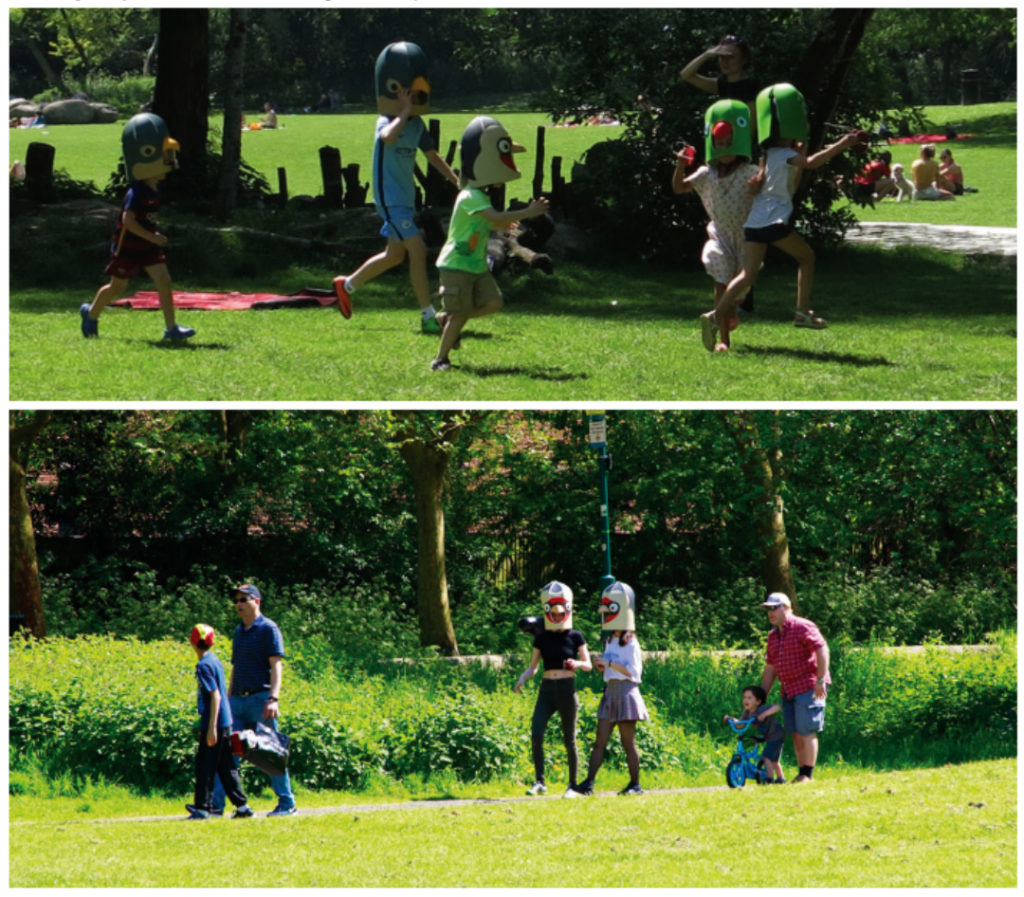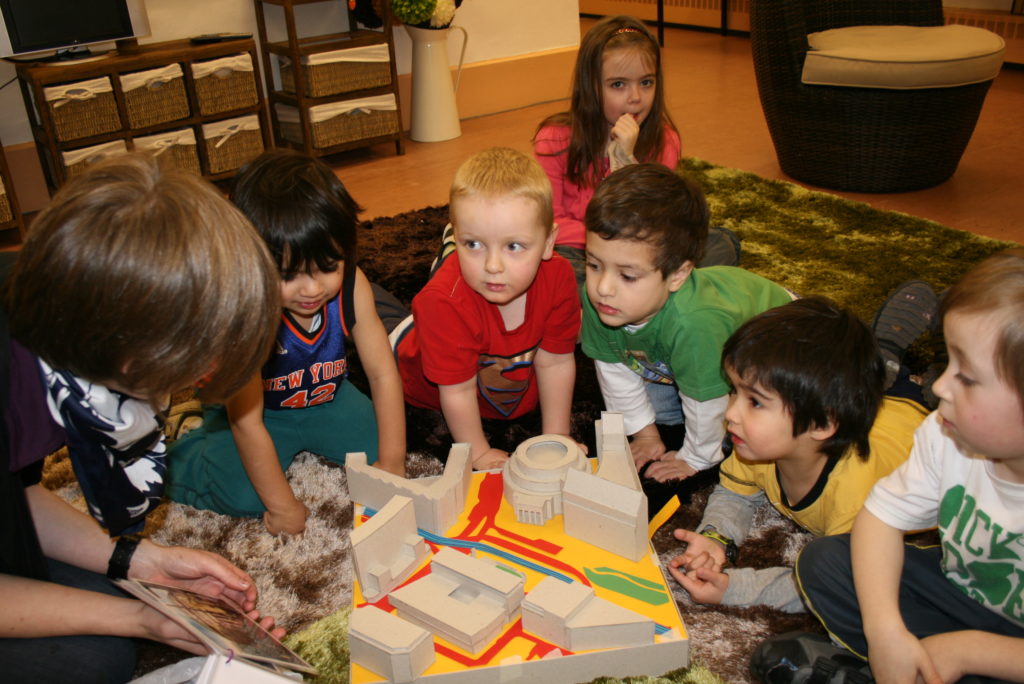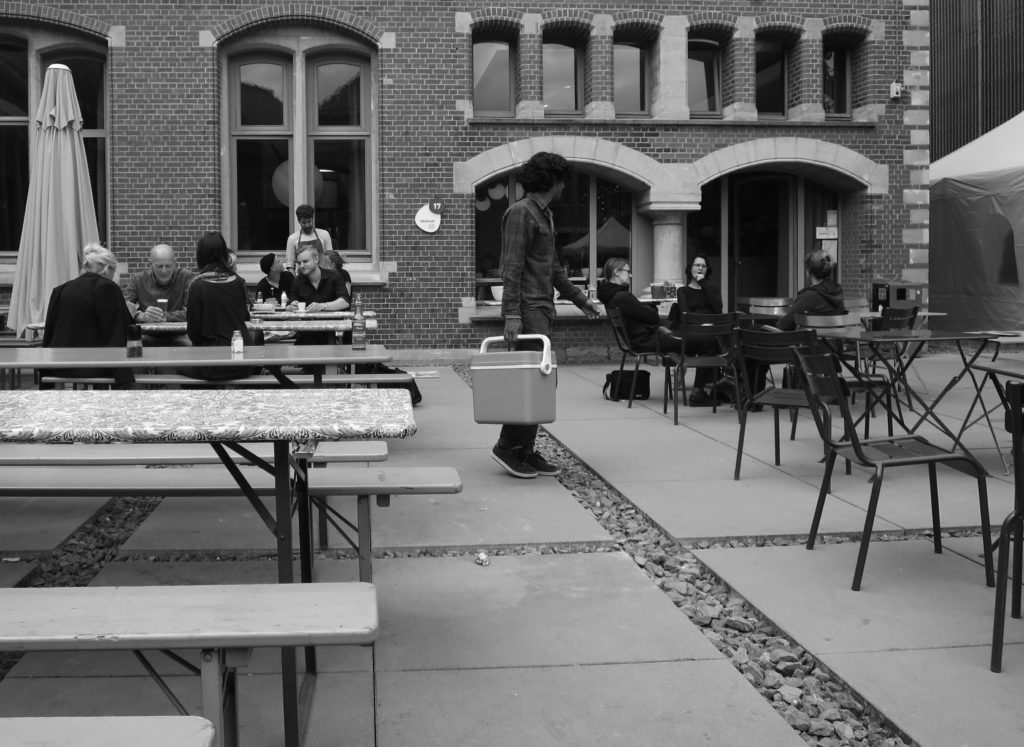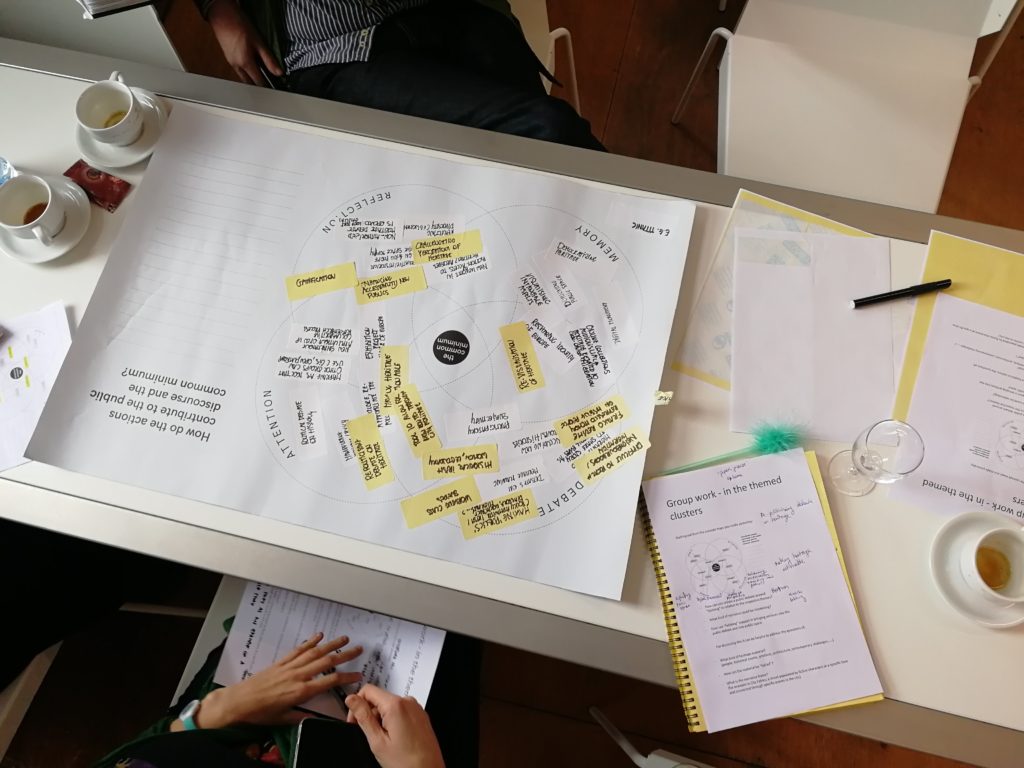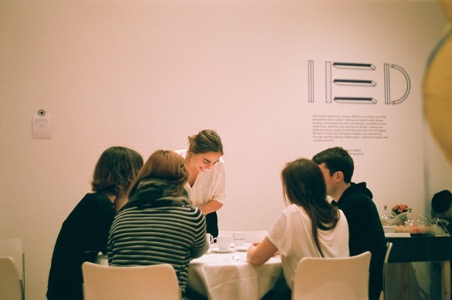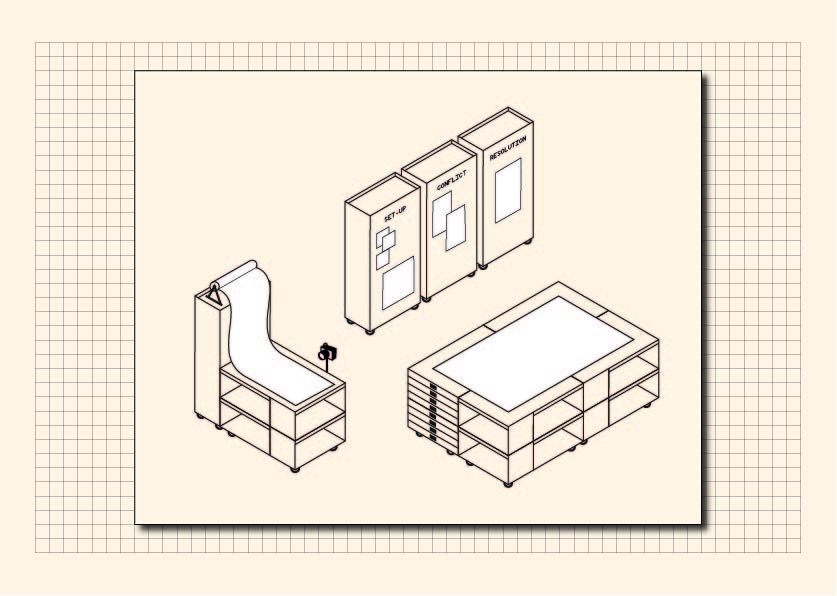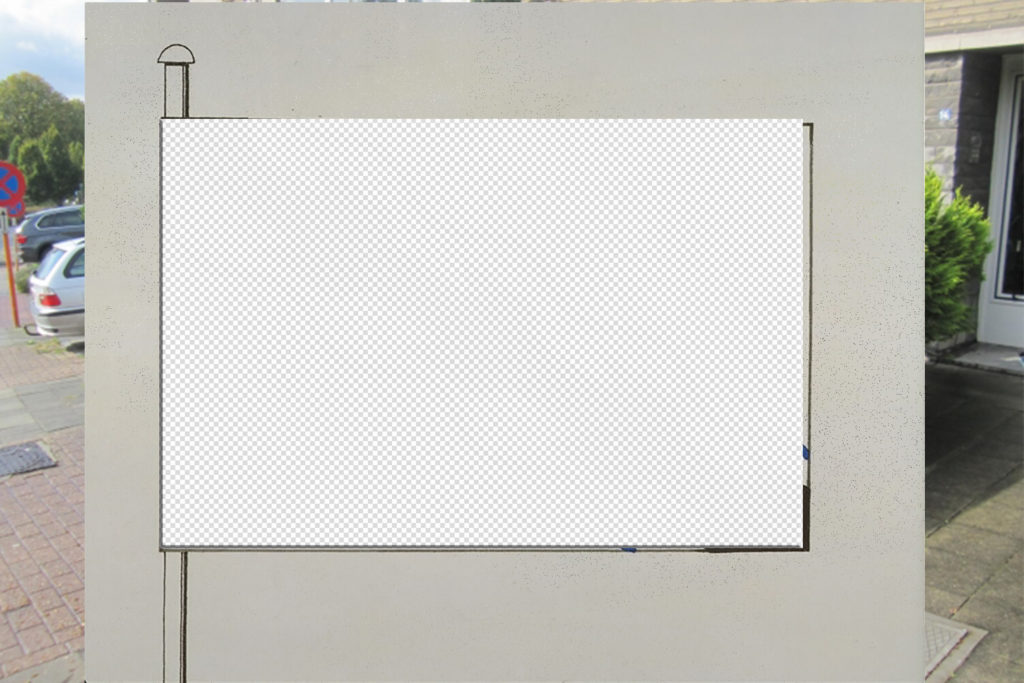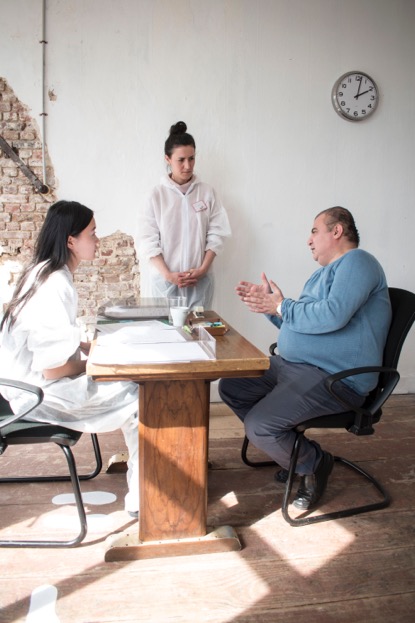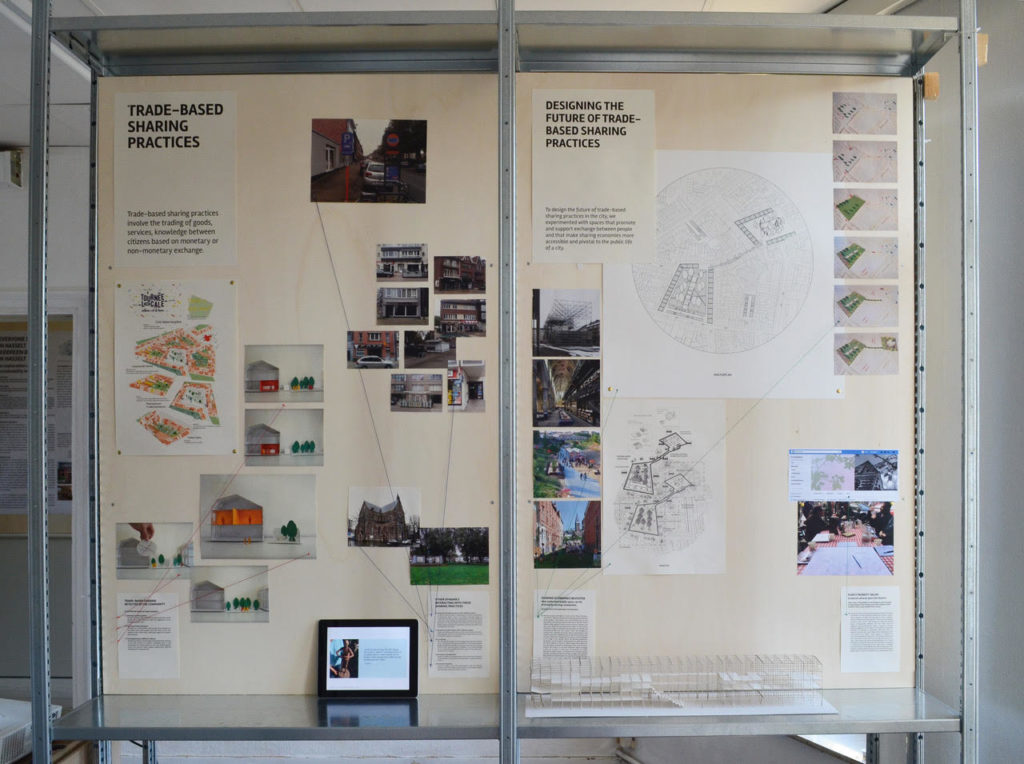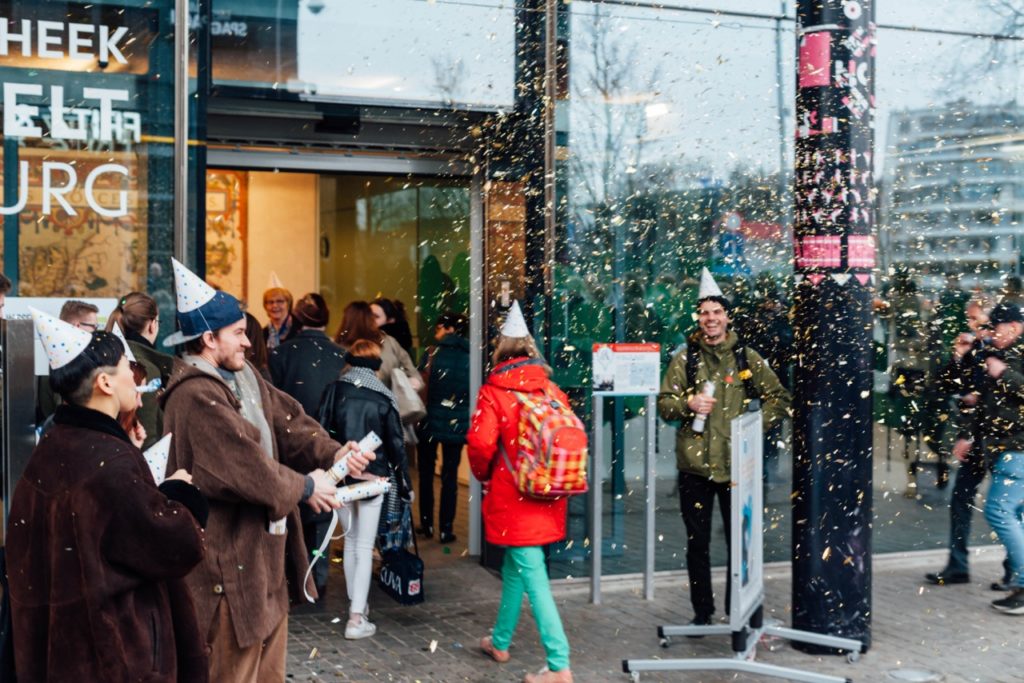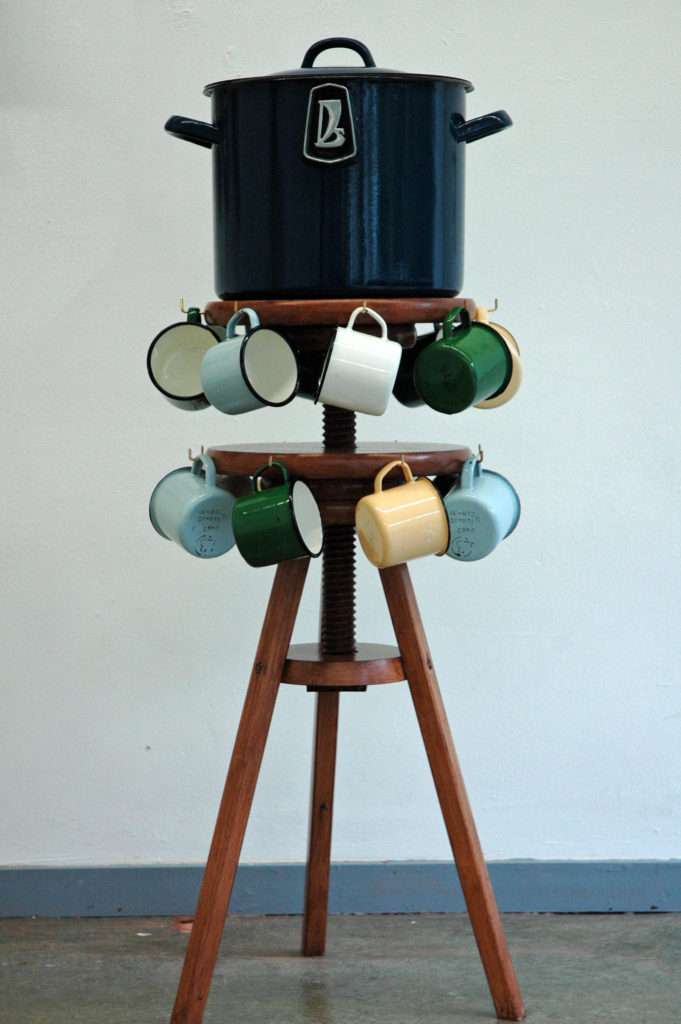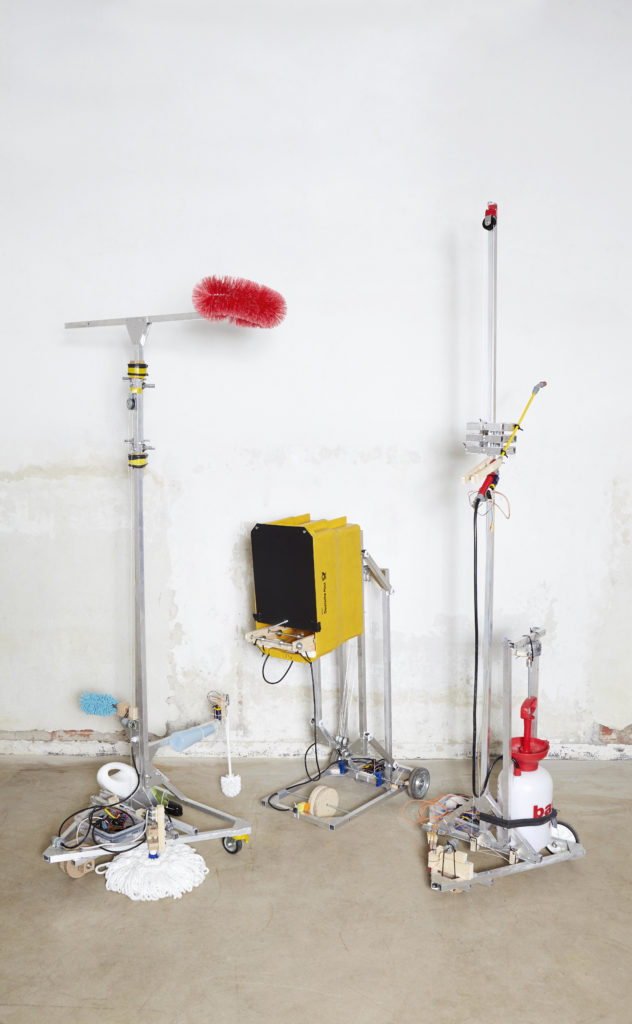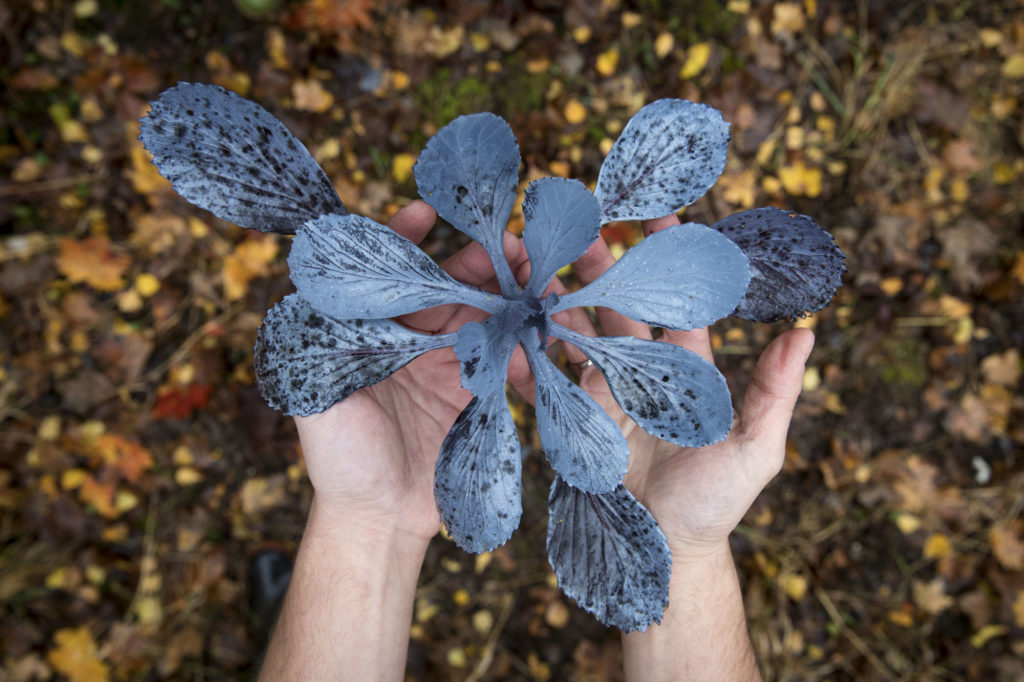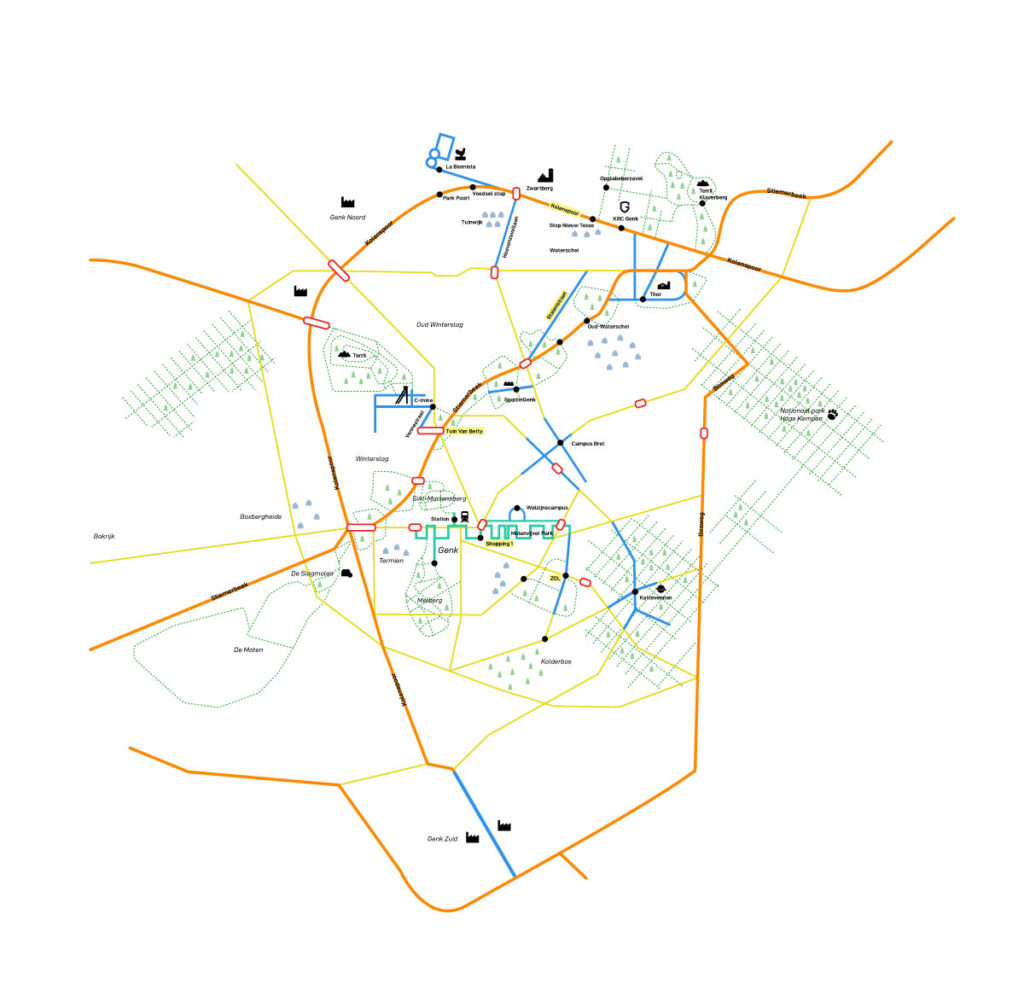The Politics of Design: Act 1
Situated Actions
Situated Actions
Wednesday 22nd of August
16:30 – 18:00
Thursday 23rd of August
14:00 – 15:30
Hasselt (Z33 + public space)
The Politics of Design: Act 1
The Politics of Design: Act 1 exhibition presents works of 15 designers and collectives selected as participants in the ‘Situated Actions’ strand of the 15th edition of the international Participatory Design conference. UHasselt, Faculty of Architecture, LUCA School of Arts, Z33 – House for Contemporary Art, the city of Hasselt and the city of Genk present these 15 situated actions in order to address the debate on public space (in Hasselt) and on the politics of design. This ‘first act’ is a first exhibition in a longer trajectory, that aims for starting new collaborations on a local, regional and international context that will result in a ‘final act’ in 2020.
The Politics of Design: Act 1 intends to contextualise current participatory design practices that are part of the Participatory Design Conference by placing them in a dialogue with several local and international projects which will also be presented in the exhibition. The exhibition presents 3 thematic clusters that make tangible the politics of ways in which participation is given form. These ‘ways to participate’ are: BODY (participating as an individual and a physical body through practices of care and work), COMMUNITY (participating through and towards creating a collective through practices of commoning and representation) and CITY (participating as a stranger in larger scale networks, through practices of data production and collection, and contributions to complex challenges, such as sustainability).
Selected situated actions encompass Participatory Design-inspired exhibitions, interventions, participatory walks, public debates, performances and other interactive formats. During their registration at the conference, all conference visitors will be invited to subscribe for participation in interactive sessions, which will be staged at Z33 – House of Contemporary Art.
Situated Actions
More-than-Human Urban Futures: Walking towards speculative participatory design to avoid ecocidal smart cities
At Z33, Hasselt
The turn to participation within smart cities has so far struggled to address a human-exceptionalist notion of cities, where urban space is designed for, and inhabited by, humans only. Within the age of the Anthropocene – a term used to refer to a new geological era in which human activity is transforming earth systems, accelerating climate change and causing mass extinctions – a human-centred perspective is increasingly seen as untenable. This presents opportunities to not only develop innovative participatory approaches in more-than-human worlds, as a way to overcome problematic narratives of human privilege and exceptionalism, but also to question what participation could mean in our existing and future urban cohabitation.
We invite people for a speculative participatory walk to grapple and play with early outcomes of an associated workshop for more-than-human worlds, bringing together insights from an interdisciplinary group of designers, practitioners, and researchers to explore what it means to co-imagine sustainable smart cities. The walk is intended as an embodied and social exploration of how we might work towards environmentally and socially just post-anthropocentric smart cities. By taking into account the situated politics of multispecies interdependency we aim to surface alternative visions of inclusive sustainable democratic participation.
http://pd4more.urbaninformatics.net/
Workshop contributions from: Yoko Akama, Laura Beloff, Michaela Büsse, Juan Carlos Carajal Bermúdez, Sandy Claus, Jill Didur, Sisse Finken, Annika Hupfield, Owain Jones, Kaylene Kau, Clara Mancini, Ezio Manzini, Sophie McDonald, Nuno Nunes, Valentina Nisi, Paulo Patelli, Catia Prandi, Søren Rosenbak, Chris Speed and Janet Van der Linden.
Animal Diplomacy Game: Images courtesy of Kaylene Kau
Works presented in the exhibition:
Clouds & Rocks – Embracing Friction Through Research in the Making
June 2018, FHNW HGK Workshop documentation
Michaela Büsse
Through a series of experiments performed in a workshop setting the relational nature of material perception is probed. The form and representation of materials such as wax, gallium and ferrofluid are manipulated (in)directly, through heating, cooling, combining, deconstructing, photography and scanning. Through these different processes of manipulation materials are exposed to human and non-human encounters revealing an array of inherent potentialities. The material outputs of the workshop become tools for reflection-through-action processes.
Networked Communal Plant Watering
Sophie McDonald
The networked system facilitates shared plant watering between homes in a block of flats, and promotes meeting neighbours in a communal garden over a cup of tea. The installation consists of a plant pot and plant, water spout, water reservoir and water pump, and a wooden control box. The system provides each plant host with a live physical visualisation of the communities watering activities, who’s watering who’s plant at any given time, and in doing so provides a gentle presence of the blocks inhabitants within individual private homes. It is part of the Common Roots research project exploring technology to support cohesion within local communities, whist also bringing their local green environments into focus. The work aims to challenge the prevailing commercially driven tide of social networking and smart city applications, and asks what novel ways can we design the cities of the future, given that people need more than simply to inhabit them?, but to live in them – together.
Layers of Landscape: Illuminating the Archive in the Grey Nun’s Garden
Jill Didur and Caroline Alexander
This collaborative and performative site-specific installation was conceptualized as an invitation to engage in the complex histories of the Grey Nun’s Garden in Montreal Canada. The installation was comprised of twenty-five lanterns installed in the garden that hosted a different assemblage of images including photographs and documents associated with the archive, and a selection of images of the indigenous precolonial plant life from the Codex Canadensis, a manuscript by Louis Nicolas, a Jesuit missionary who lived in New France from 1664 to 1667 and visited Ville Marie/Hochelaga. Installed on June 3, 2016 at the garden event, “’Un paradis sans pommiers’ Le jardins des Soeurs Grises,” the project offered visitors an invitation to engage with the history of the Grey Nuns’ labour in the garden as a feminist avowal of women’s work, while at the same time acknowledging visually that this history is part of the colonial and colonizing history of the area.
Photos courtesy of Jin Kim 2016
Animal Diplomacy Bureau
Kaylene Kau
Animal Diplomacy Bureau (ADB) uses play as a way to help players cooperatively envision how cities may look if they were designed for both humans and animals equally. To do so ADB created a mixed-reality game that combines London locations with stories of the birds that live there, in this case the Ring-Necked Parakeet, an invasive species. Ultimately, the games translate Bird Reality into a way that humans can understand and feel empathy towards. The process allowed people to think and draw their own conclusions about a serious but often sidelined topic, human—animal relations.
Photography by Gary Schwartz (c) QMUL 2018. Supported by EPSRC Fellowship EP/L020505/1
Protoplasmic Routes
Axel Cuevas Santamaría
Protoplasmic routes is an audiovisual BioArt project based in scientific research and fiction. This project reveals a metaphor and a temporal reality exploring the complex interactions of the growth, movement, and learning of Physarum polycephalum, a plasmodial slime mold. By contemplating slime mold’s self-awareness inside acrylic mazes built on Petri dishes, compassion is built between this species and our own. The story line focuses on the livability of the human species in this twenty-first century. A story told within the vital relationship with technology and microorganisms that have been our symbionts and co-travelers since our species emerged millions of years ago. The inquiries about the future in this story are narrated by slime mold Physarum polycephalum, representing a microscopic elder consciousness personified by Eva, the computerized voice from OSX.
The Library of Engagements
At Fietsbar Cycle Shop, Minderbroedersstraat 54, Hasselt
The ‘Library of Engagements’ is a live installation. It is a participatory design tool for engaging citizens in the production of space, urban and architectural design in the city. This piece of work aims to bring the debate about community participation and public consultation in the built environment to as wide an audience as possible and hopes to contribute to the movement to obliterate the myth that space is produced by a single person. Most of all it is generous and connects to the individual participant to suggest a method that they could use in their own community or neighbourhood.
The librarian, Emily, invites individuals, or small groups to share a collection of “methods of engagement” – which are inspirational ideas to transform where you live. Emily will personally present the methods in the form of a library catalogue and archive, which she will share through objects, artefacts and stories to suit each visitor.
Emily is an architect and urban designer with a desire to involve as many people as possible in the design of spaces, buildings, neighbourhoods and cities. The Library of Engagements will take place on Tuesday 21 August at Fietsbar Cycle Shop, Minderbroedersstraat 54, 3500 Hasselt and it is open to the public – everyone is welcome to attend.
Democratic Drinking Bar
At Z33, Hasselt
The Democratic Drinking Bar is an interactive situated action by Ann De Keersmaecker that intervenes in the PDC2018 official reception bar. The drinks menu of the Democratic Drinking Bar is created together with the stakeholders of the conference; people that navigate in close proximity of the bar, from international workshop hosts to the local cleaner. Each stakeholder can make several decisions, from putting a drink on the menu and naming the price of that drink, to deciding where the profits of the selling of that drink go to.
By inviting the stakeholders to shape the drinks menu, Ann De Keersmaecker co-acts as a bar owner, intervening in the existing bar. The democratic intention of the intervening action changes the selection of drinks, the financial model, and possibly even the decisions of the visitors of the bar.
The Democratic Drinking Bar questions the semi-publicness of a bar, whether and how a bar represents the people that meet there and visit it. It attempts to visualise a small-scale locally embedded democratic system intertwined with the capitalist system. Ann De Keersmaecker believes that a bar, where a specific audience meets, may be shaped by that audience and its stakeholders.
Critical Heritage – A participatory approach to exhibiting research
At Z33, Hasselt
We are a group of 15 PhD students working on a Marie Sklodowska-Curie Actions (ITN) project titled ‘Critical Heritage and the Future of Europe’ (CHEurope). CHEurope project aims to explore the processes by which heritage is ‘assembled’, through practice-based research on themes where cultural heritage is undergoing profound change, such as wellbeing or participation. We will take part in PDC2018 with a work-in-progress exhibition which will present our current research concerns and findings while critically engaging with different viewpoints on participation and participatory ways of working with heritage. This growing exhibition is being developed through several participatory design (PD) workshops which allow us to create and curate it together, with the help of several designers experienced in heritage-related PD.
As part of the PDC2018 Situated Actions strand, the visitors will take part in our fableing experiment: a discussion on our research material narrated in five fables related to the five topics we are working on: Heritage and Wellbeing, Curating the City, Participation and Management, Digital Heritage and Heritage Futures. Fableing* is a method where design fiction is used for ‘narrativization and possible world explorations, in order to support public debates performed with historical material as a starting point. Our fables will narrate our collective research material, its challenges and dilemmas, while inviting the visitors to take part in a debate on heritage related to the participatory design framework.
Acknowledgements: The exhibition project is produced by the 15 PhD students of CHEurope: Moniek Driesse, Mela Zuljevic, Anne Beeksma, Lukasz Bugalski, Khaled El Samman, Marcela Jaramillo Contreras, Katie O’Donoghue, Carlotta Capurro, Nermin El Sherif, Marcia L. Hattori, Janna Oud Ammerveld, Vittoria Caradonna, William Illsley, Nevena Markovic and Hannah Smythers.
*We would like to thank Maria Engberg and Per Linde for introducing us to the notion of fableing, as well as Liesbeth Huybrechts, Vlad Ionescu, Roel De Ridder and Marijn Van De Weijer for helping us in participatory work on our concept maps during the workshop we organized in Hasselt in April 2018.
Data Objects for Hasselt elections
At Z33, Hasselt
Design-led activism seeks to create a counter-narrative to motivate social, institutional, environmental or economic change. At PDC 2018 we will perform design-led activism through the design and deployment of “Data Objects” (DO) for the cities of Hasselt and Genk. DO are functional objects whose form and function encode data. These everyday physical objects range from household devices to street furniture, wearable devices, educational materials, and interactive exhibits. DO are particularly appropriate for design activism by enabling people to physically access and make sense of information to assist open dialogue towards more informed and empathic choices. The DO presented at Z33 aim to support informed voter deliberation and decision making in the upcoming regional election by making relevant data available, usable, and understandable.
Co-production Teatime
At Z33, Hasselt
Co-production Teatime is a prototype developed to support inquiry processes in co-production – the close collaboration and co-creation of knowledge between academic researchers and partners from industry and municipalities. In an attempt to bridge gaps between stakeholders with different interests, expectations and knowledge horizons, the teatime explores the use of artefacts and ritual in dialogue-based inquiry. The purpose is to prompt playful interactions, the sharing of diverse perspectives, and to deepen understanding about ways of co-producing. Co-production Teatime is developed within Laura Gottlieb’s PhD project, which uses a design-oriented research approach to explore creative and experiential ways to prompt inquiry in co-production.
In the situated action, participants from the conference are invited to partake in a short version of this teatime. The discussion will focus on challenges in co-production. The purpose is to share experiences with other researchers and to address areas for development and future research in co-production. The teatime will stimulate the senses as a means to trigger metaphors, reflection and discussions about this topic.
Story LAB. Documenting design projects as open scenarios
At Z33, Hasselt
For the situated action we focus on Cirkel Sector Genk. A mobile design studio on a mission to shape the circular economy in Genk based on local resources and knowledge. The design projects that are being developed in the framework of the Cirkel Sector Lab involve both technical and social design challenges; they require innovative design solutions and they include actors with conflicting perspectives.
These challenges are not often resolved in the timeframe of one project. To sustain the knowledge developed throughout the project we look towards scenarios to document, archive and share design projects by using a storytelling format.
De Eendagspartij (The One-day Party)
At Runkstersteenweg 37, Hasselt
De Eendagspartij (The One-day Party) is an intervention that aims to give citizens, in light of the upcoming local elections in Belgium, a platform to voice their own views as opposed to having to conform to one of the existing party programs. The fictitious political party will invite residents of the city of Hasselt to join and shape their own program on the dedicated day. By stimulating the involvement of inhabitants in the shaping of their own environment the project questions the functioning of a purely representative democracy.
Furthermore, the project discusses the issue of ownership in public space by letting the participants design and print their own posters and post them in the surrounding public space. It explores the use of vernacular (graphic) design as a way to connect more closely to the context and its actors. By opening up space for participants to create with their own skills and habits as a starting point the intervention investigates how the identity of the individual can not only be substantively present but also how they themselves can express this formally.
De Eendagspartij will take place a few weeks prior to the conference. However, PDC attendees will be able to engage with the ‘traces’ of the intervention at the exhibition space in Z33, Hasselt. Visitors will be invited to join De Eendagspartij and use the artifacts from the installation to promote the party and its open programme during a brief public manifestation.
Office for Bureaucritic Imagination – State of Exception
At Z33, Hasselt
The “Office for Bureaucritic Imagination – State of Exception” is a participatory speculative performance inspired by Hannah Arendt and Giorgio Agamben’s philosophy on the potential of active participation in the process of law generation, thus questioning today’s ideas of democracy and participation in city life. The concept, “State of Exception” is influenced by Agamben’s notion of a space where the normal laws and regulations in society are suspended. This idea is borrowed for the performance, in which the status quo of laws is questioned and new laws are imagined.
In a representative democracy, participation in politics is often understood as being reserved to politicians. Although politics affects the lives of every individual, the divide between public interests and private interests is becoming increasingly apparent. Participatory democracy bridges the divide between public and private interests in juxtaposition to bureaucratized and elitist form of politics. Hannah Arendt’s concept of participatory democracy encourages action, plurality and freedom – where human multiplicity and different standpoints can pave way for interesting debates and better political inclusivity. In order for political participation to take form, spaces for political action are required.The “Office for Bureaucritic Imagination” is a performance, speculative design and a stage where the coming together of a diversity of people to deliberate on public affairs allows for different voices to be heard and considered, especially those from the unrepresented segments of the population. The office provides a meeting point for politicians, civil servants, citizens and local associations to speculate on alternative futures through laws.
Photo: Martyna Wittbrodt
Office for Bureaucritic Imagination – State of Exception
Performance at the Everyone Loves Ice Cream Festival 7th April 2018
Everyone shares in Hasselt. A perspective on the political potential of Spatial commoning.
At Z33, Hasselt
Sustainability is an important topic on the agenda of many cities today, certainly since the 17 Sustainable Development Goals (SDGs) were officially launched in 2016. To further investigate this meaning of sustainability on the level of the city and its citizens, a group of local and international students, designers, artists and architects and the city of Hasselt worked together to see how people share (in) their city today and how this can advance the sustainable development goals.
During PDC’18 we present an interactive exhibition that discusses the role of PD in contemplating on and articulating the political potential of spatial sharing in the city in addressing these sustainability challenges. On the one hand, we showcase how communities already organise and share their common concerns, goods or information (i.e. commoning) in Hasselt, often on a micro-level. On the other hand, we present design proposals that experiment with how spatial practitioners can give form to infrastructures to support these practices to relate to or act against various institutional frames on a meso- and macro-scale to disclose and enhance their political potential and gain impact on a supra-local level (i.e. institutioning).
The situated action invites participants to reflect on different types of sharing detected in Hasselt (care-, value-, trade- and need-based sharing). Together they discuss what actions can contribute to the development of institutioning as a conscious practice by designers to develop infrastructures that can enhance the political potential of self-initiated and already existing sharing on different scale levels.
Designing for a City of Lies. How to Rethink Belgium’s Smartest City Through Engaging the Imaginaries of Its Local Citizens
At Z33, Hasselt
In order to meaningfully speculate on what a city could become, we need to first understand what a city currently is. Designing for a City of Lies is a project that sets out to answer this question, not through mapping what the city is, but what it is not. This is done by asking local citizens to tell lies about their city, and then feed these lies back to the city as designed urban interventions, prototyping new urban futures. Importantly, the project seeks to engage local citizens in new, more inclusive and playful ways throughout this process.
The project took place in Hasselt, the smartest city in Belgium, across April 2017 – January 2018, and resulted in the collection of numerous lies and two designed interventions. Returning to Hasselt for PDC2018, the project invites conference participants to engage with lies as a viable data set for envisioning urban futures, pushing beyond the trite renderings of “smartness” so prevalent in current near futures.
Towards Togetherness: Probing as a Decolonizing Approach.
At Z33, Hasselt
Probology is an approach that uses probes to encourage subjective engagement, empathetic interpretation and a pervasive sense of uncertainty. Some of the probes that were designed and used for the PhD project Towards Togetherness are shown and put in practice again during this Situated Action. However, we will not reenact (parts of) the project. For example, soup will be served from a Lada Niva pan and consumed on an embroidered blanket, to probe for responses on the use of food during participatory practices. The probing will focus on an artistic approach towards participation and is engaged with the topic of decoloniality.
The participants will be invited to express their opinion about current decolonization processes, or to share their experiences in creating a temporary feeling of togetherness. GoPro cameras support the probing action and enable participants to record themselves and each other. Fragments of the recordings, as probing results, will become part of the main outcome of this PhD: an interactive road-movie that questions aspects of decolonization and gift-giving during a road-trip in a Lada Niva from Belgium to the Nenets people in Arctic Russia (the Niva to Nenets project).
Post-Labouratory
At Z33, Hasselt
The Post-Labouratory is an answer to the rapid automation of labour and the resulting cultural crisis. It liberates us from the idea of the necessity of labour and supports us in discovering our true desires. It offers participants the possibility to abolish their job by developing a robot that does their labour with the engineering help of post-labour companions.
Through the abolition of their labour, the participants can explore a post-labour future. The post-labour companions assist the participants to reconsider their desires during individual sessions. The creative action of making and discussions about work, leisure and life enables this passage. The Post-Labouratory claims that the quality of automating technology increases if the specialists – people working in the job to be automated – take an active part in the development of the robot. During the development process the robot becomes the apprentice of the participant.
The Post-Labouratory combines the skills of the participants and the post- labour companions that include design, engineering and social sciences. The Post-Labouratory supports the transition of workers into non-workers and the building of a post-labour future.
www.ottonieroeder.de/post-labouratory/
Photo by Femke Reijerman
mijnKOOL, Organic Photography as a Participatory Design Method
At Z33, Hasselt
mijnKOOL is an artistic participatory research project in which photographer Kristof Vrancken and design studio SOCIAL MATTER examined the soil quality and composition in Genk by using red cabbage as a medium in an organic photographic process. Plants can play an important role in detecting soil structures and properties, for example, red cabbage works well as a bio-indicator.
The participants created a photographic emulsion with their crop through anthotype process, which resulted in an image. Depending on the acidity and composition of the soil in which the cabbage grew, the colour quality of the print was differing from sample to sample. The use of red cabbage as a measuring instrument gives an understanding of the impact that soil properties may have on ecology and food-production.
For the participatory design conference, I want to display the results of the project in an open atelier – lab format, as well as to launch a similar project in the public space of Hasselt. The participants of the conference are invited to join the experiments and think about future potentials of this methodology.
WegenWerken. A design journey down the slow roads
At Z33, Hasselt
The project ‘WegenWerken’ (RoadWorks) looks into the role of soft connections in the city of Genk to visualise and encourage their future as public spaces by contributing to community life, local economy and sustainability. We are interested in learning how a participatory design approach can help us understand, test and activate them as spaces of productive potential in city-making. We experimented with different participatory mapping tools leading to interactive design output including a slow road network map of Genk as well as a toolkit with actions to realise and activate this network. Both are framed and informed by an in-depth interaction between the scale of the city (the network) and the scale of the neighborhood (the path).
We will exhibit the different mapping tools produced within this project and an interactive map which will engage the visitors to use or complete the toolkit of actions by looking into the space of connections between the cities of Hasselt and Genk. Here, we aim to explore the performative and political characteristics of the mapping tools in relation to the participatory framework.
